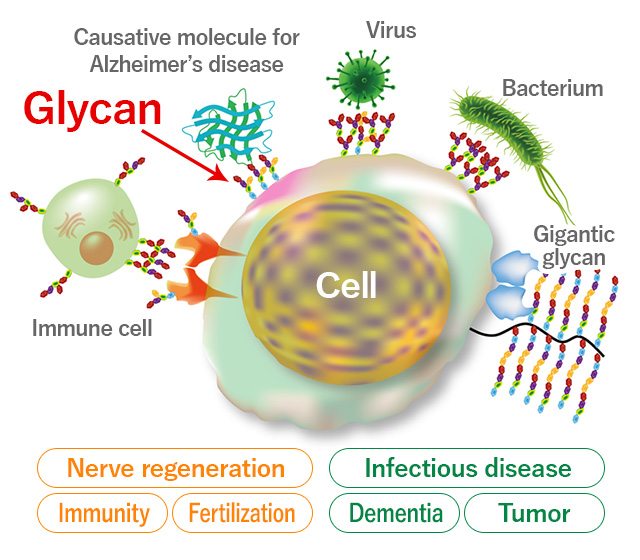Glycans are complex carbohydrates built according to biological rules
Glycans, known as the third life chain besides nucleic acids (genome) and proteins, represent one of the three major biopolymers in life forms. Glycans are essential biomolecules that play a significant role in a wide range of biological phenomena, such as immunity, development, neural signalling, and so on. They are typically bound to proteins and lipids on the cell surface and their abnormal expression and structure has been implicated in various diseases, including cancer and dementia.
Due to the complexity of glycans, the analysis of their structures and functions is extremely complicated. In comparison to genomes and proteins, our understanding of glycans has been insufficient. In the life science field, glycans represent the final piece of the puzzle to understand what life is.
It is thought that the integration and further development of glyco-research with different areas will reveal the essence of life. Elucidation of the structure and function of glycans will lead to an understanding of various diseases, which may result in the development of early diagnosis of diseases, personalized medicine, and innovative treatment and prevention methods.
Understanding life. All cells are covered with glycans.
Glycans cover the surface of all cells in our body and play an essential role in determining of our cells’ unique characteristics and regulating of intercellular communication. These complex molecules also enable cells to recognize extracellular substances, such as neighboring cells, pathogens, and other molecules. Thus, they are critical to a range of physiological processes and diseases, including immunity, neural functions, aging, infection, tumor growth, and dementia. Despite their importance, glycans remain largely understudied. However, glycoscience research has already led to important advances in modern medicine, including the development of glycan-targeted drugs like Tamiflu and the enhancement of antibody therapy for cancer treatment.
To unlock the full potential of glycans and improve human health, it is critical that J-GlycoNet continues to advance glycoscience research. By investing in this field and promoting interdisciplinary collaborations and innovative technologies, J-GlycoNet can better understand the role of glycans in living systems and pave the way for new discoveries and treatments.

Glyco-research will achieve the full understanding of life
Despite their critical roles in many physiological phenomena and diseases, glycans remain relatively understudied due to several major challenges. Firstly, the structural complexity and diversity of glycans far exceeds that of nucleic acids and proteins, requiring highly specialized techniques for their synthesis, analysis, and biological investigation. Secondly, there is a lack of integrative research centers that can bring together the findings from diverse glycoscience studies to develop a more comprehensive understanding of glycan functions. Finally, while the fields of genomics and proteomics have advanced significantly due to the availability of "big data" approaches, there has been limited research on glycan big data, or glycomics.
To address these gaps in glycoscience research and promote a better understanding of the essential role glycans play in life processes, iGCORE has been established. Through interdisciplinary collaboration among scientists with expertise in chemistry, biochemistry, medicine, and imaging, iGCORE aims to shed light on the functions and physical properties of glycans, as well as the properties of assembled glycans. By overcoming the major challenges of glycoscience research, we can ultimately enhance our understanding of the fundamental nature of living systems and improve medical care.

